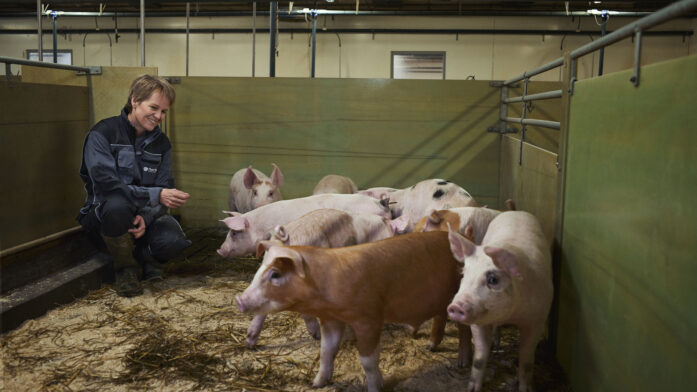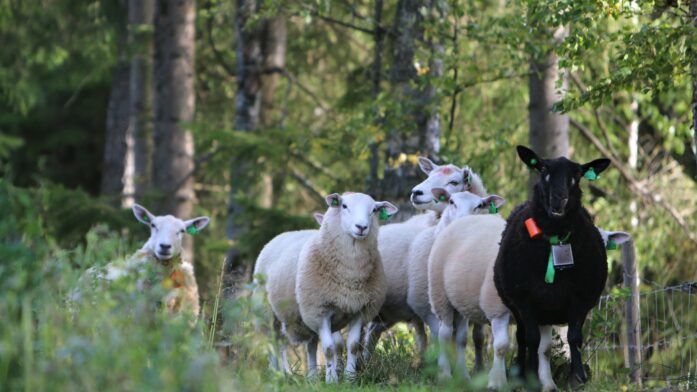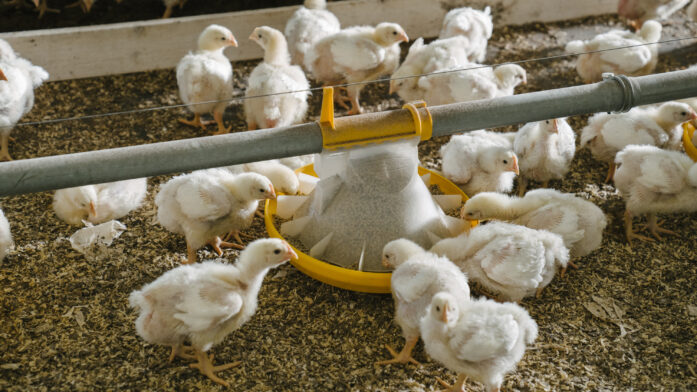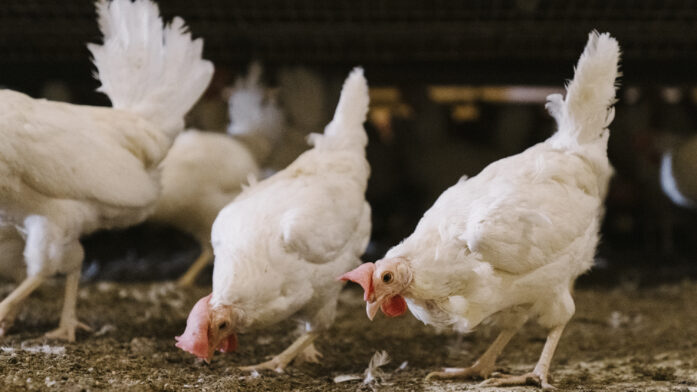Animal welfare
Farmers delivering to Norturas brands must comply with national demands towards animal welfare in order to maintain the expected levels of animal welfare. Norway has regulations that sets specific requirements to living conditions and how the animals are to be treated.
Nortura work actively to develop and improve animal health and animal welfare in all stocks, and the Norwegian levels of medications are low.

Most Norwegian pigs live indoors all their lives, as they depend on good and stable climate, with little draft and good temperatures. This gives the farmer more control over feeding and makes it easier to detect possible infection and disease.
Pigs are exploratory animals and have an urge to dig and search with their snouts. Norturas producers are therefore obliged to provide activity and rooting material to the animals in order to give them opportunity to perform its behavioural needs. Regulations applies to all Norwegian pigs in Nortura's production.
It is important for to give pigs the opportunity to investigate their need to explore and investigate. In the research project Griseløftet, Nortura and researchers at NMBU, investigate different types of material and combinations of these in order to gain further knowledge about what produces the best response in the pig.

For a minimum of 8 weeks a year, Norwegian cows and calves lives outside in open air. All cows also have their own health card. All important information about health and medication use is documented there.
Norway is among the countries that rank lowest in the world when it comes to antibiotic use. Norwegian cattle are not given unnecesary antibiotics to prevent diseases; the use of hormonal growth-promoting drugs for food-producing animals is also prohibited in Norway. Norturas appraoch to animale welfare and animal health are based on the beliefs of preventive work, rather than through the use of treatment with drugs.

Most Norwegian sheep and lambs graze out in the open during the summer, and animals are to be found in coastal areas, rural areas and in the mountains. This is unique for Norway and gives the meat a unique quality. Outdoor grazing reduces the risk of being infected by diseases, and it is good for the sheep to graze in peace. The sheep farmers regularly supervise the animals to check that everything is as it should be.
At Nortura, we have a close dialogue with our sheep farmers. We provide advice and guidance on everything from feeding, breeding, sheep control, finances and general operations, lambing, ear tagging and shearing.

Both chicken and turkeys live indoors in heated and insulated buildings. Norwegian chicken and turkey are not given antibiotics to prevent disease. The Norwegian regulations for the use of antibiotics set clear requirements that the use of antibiotics for preventive purposes, so-called prophylactic antibiotic use, is prohibited. Use of hormonal growth-promoting drugs for food-producing animals is also prohibited in Norway.
Requirement towards areas for chicken breed in Norway are among the strictest in Europe. A maximum of 36 kilos of live chicken per square metre is permitted in standard chicken production, as opposed to the limit in most other countries in the EU - 39 or 42 kilos.
Nortura also has production with lower density requirements.
Norway is in a unique position in the world context when it comes to the limited use of medicines. In 2016, Nortura phased out the use of narasin as a parasite agent in chicken feed and is now working to complete a corresponding phasing out of the parasite agent monensin for turkeys during the first half of 2022.
Part of the reason for the good animal health in poultry is that we follow the "everything in, everything out" principle. This means that a building housing chickens or turkeys only has one flock at a time, this ensures that infection is not transferred from one flock to the next.

Norwegian laying hens are generally in good health and very rarely need medication. Antibiotics are not used to prevent diseases. Growth hormones are completely prohibited in Norwegian agriculture.
In Norway, Health Authorities have not registered a single case of salmonella disease from Norwegian eggs. This is an unprecedented situation in a global context.
About 97% of the laying hens in the Nortura value chain are kept in free-range systems, while 3% are in environmental housing, i.e. cages where the hens are kept in groups of 7 to 42 hens. All eggs delivereds to the PRIOR brand come from free-range or organic hens.
Free-range hens move freely within the hen house and have access to a perch, a laying box and the possibility of taking a dust bath. This also applies to hens in organic farming, except that they have a little more space, the opportunity to go outside and they eat organically grown feed. Hens in environmental housing have access to a perch, laying box and dust bath.
